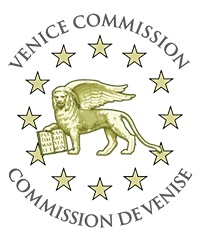
Venice Commission
The Venice Commission, officially European Commission for Democracy through Law, is an advisory body of the Council of Europe, composed of independent experts in the field of constitutional law. It was created in 1990 after the fall of the Berlin Wall, at a time of urgent need for constitutional assistance in Central and Eastern Europe.
Formation
May 10, 1990 (statute)
Strasbourg, France (Secretariat)
Scuola Grande di San Giovanni Evangelista, Venice, Italy (Plenary)
Creation[edit]
The idea to create a Commission for Democracy through Law as a group of experts in constitutional law was conceived by the then Minister for Community Policies of Italy, Antonio Mario La Pergola.[2] The election of the name was based on the theory of La Pergola that expressed that sustainable democracies could only be built in a constitutional framework based on the rule of law.
The formal proposal for the creation of the commission was made by the Italian Minister of Foreign Affairs, Gianni De Michelis, who invited the other Foreign Affairs ministers of the Council of Europe to the Conference for the Creation of the European Commission for Democracy through Law that was held at the Giorgio Cini Foundation in San Giorgio Maggiore, Venice from 31 March to 1 April 1989. At this meeting, Foreign Affairs and Justice ministers reunited with representatives of the Constitutional Courts of the 21 countries of the Council of Europe.
The committee of ministers, seeking to assist the countries of Central and Eastern Europe, approved the creation of the Commission as a partial agreement at the session in Venice from 19 to 20 January 1990. The Foreign Affairs and Justice Ministers of Bulgaria, Czechoslovakia, Hungary, Poland, the German Democratic Republic, Romania, the Soviet Union and Yugoslavia also participated as observers in this meeting.
On 10 May 1990 ministers from 18 countries (Austria, Belgium, Cyprus, Denmark, Finland, France, Greece, Ireland, Italy, Luxembourg, Malta, Norway, Portugal, San Marino, Spain, Sweden, Switzerland and Turkey) of the Council of Europe adopted the statute of the Commission.
The members are "senior academics, particularly in the fields of constitutional or international law, supreme or constitutional court judges or members of national parliaments".[5][6] Acting on the Commission in their individual capacity, the members are appointed for four years by the participating countries. The current and former members include, amongst other notable academics and judges:[7]
Leadership[edit]
Antonio Mario La Pergola was the first President of the Venice Commission. Jan Erik Helgesen,[10] a professor at the University of Oslo, was president of the Commission for several years, through to 2009, later becoming 1st Vice-President. From December 2009 to December 2021, Gianni Buquicchio held the presidency.[11] Claire Bazy-Malaurie has been president since December 2021.[1]
Simona Granata-Menghini is the current Director, Secretary of the Commission. The Secretary heads the Commission's secretariat at the Council of Europe's headquarters in Strasbourg.
The Commission’s prime function is to provide constitutional assistance to member states. This assistance mainly comes in the form of Opinions. These Opinions relate to draft constitutions or constitutional amendments, or to other draft or legislation in force. The Venice Commission Opinions on specific countries cover a wide range of topics: the system of checks and balances, and the relations amongst different branches of power, the territorial organisation of the States, principles of the rule of law, fundamental rights and freedoms, organisation of the bodies of the constitutional justice, the governance of the judiciary and of the prosecution service, status and powers of ombudspersons, reforms of the electoral system, regulations on the political parties and referendums, etc. At the request of a constitutional court or the European Court of Human Rights, the Commission may also provide amicus curiae briefs on comparative constitutional and international law issues related to a case under consideration.
Requests for opinions come from the participating states and the statutory organs of the Council of Europe or international organisations or bodies participating in the Venice Commission's work. The opinions adopted by the Commission are not binding but are mostly followed by member states.
The areas of the Commission's activities are as follows:
The work of the Commission in the field of elections, referendums and political parties is steered by the Council for Democratic Elections (CDE). The CDE is a unique tripartite body made up of representatives of the Venice Commission, the Parliamentary Assembly of the Council of Europe (PACE) and the Congress of Local and Regional Authorities of the Council of Europe. The aim of the Council for Democratic Elections is to ensure co-operation in the electoral field between the Venice Commission as a legal body and the Parliamentary Assembly and the Congress of the Council of Europe as political bodies, in order to promote the European common values in the field of elections – the principles of the European electoral heritage.
The Commission identifies and develops standards in the area of elections through:
Another branch of the Commission's activities includes co-operation with the constitutional courts and equivalent bodies. Since its creation, the Venice Commission has been aware that it is not sufficient to assist the states in the adoption of democratic constitutions but that these texts have to be implemented in reality. Key players in this field are constitutional courts and equivalent bodies exercising constitutional jurisdiction.
Cooperation with Constitutional Courts, ordinary courts and ombudspersons is done by means of: